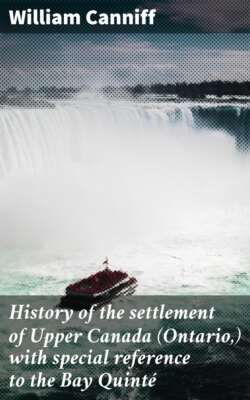Читать книгу History of the settlement of Upper Canada (Ontario,) with special reference to the Bay Quinté - William Canniff - Страница 15
На сайте Литреса книга снята с продажи.
MASSACHUSETTS.
ОглавлениеThe territory of this State was originally discovered by the Cabots in 1497, and visited by Capt. John Smith in 1614, by whom it was said to have been named New England. It consisted of the present States of Maine, New Hampshire, Vermont, Rhode Island, Connecticut, and Massachusetts. In 1620, upon 22nd December, the Puritan Fathers landed upon the Plymouth Rock, some 30 miles from Boston, and planted the first of the New England States. The “Mayflower,” by which they had traversed the Atlantic was only 180 tons burden. She sailed from Southampton with 102 emigrants. Half of this number died from cold and hardship the first year. They selected for their first Elder one John Carner, who as chief officer had great control. He has consequently been called the first Governor of New England. The territory had been granted by James I. to the “Plymouth Company.” Although the Puritans had left their homes because they did not enjoy their rights, they forgot the Golden Rule in their forest homes. They failed to remember that the Indian had rights. The untutored native thought he had a right to the soil, and as the Puritans, unlike Penn, were unwilling to recognize his rights, but undertook to appropriate the territory, there ensued bloody Indian wars. The Puritan revenged himself, and the native retaliated. So, for many years border massacres were common and terrible.
Massachusetts with the other New England States, took the lead in rebellion, and by great pains succeeded in indoctrinating the midland and Southern States. The first blood of the rebellion was shed in this State, at Lexington and Bunker Hill. The State supplied troops in 1775, 16,444; in 1776, 13,372. The quota subsequently required was 52,728, of which 38,091 was furnished.
But Massachusetts had not a few true-hearted loyalists of whom a considerable number became settlers in Upper Canada. At the evacuation of Boston “1,100 retreated in a body with the Royal army. Altogether there left Massachusetts at least 2,000 United Empire Loyalists.” The Colony of Maine also had a good many adherents of the crown—(Sabine.)
